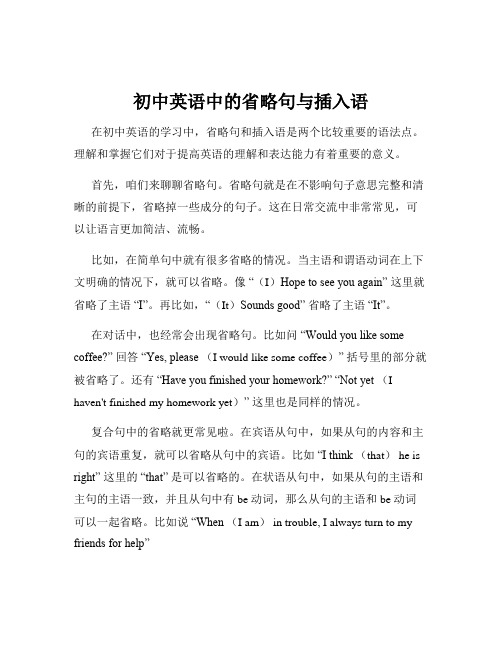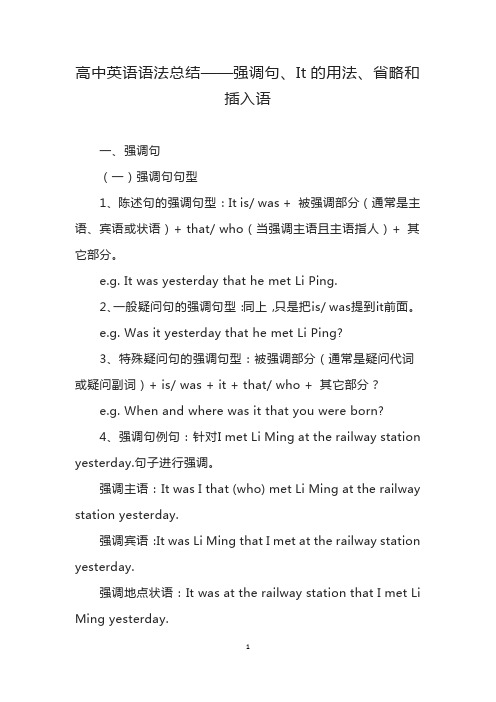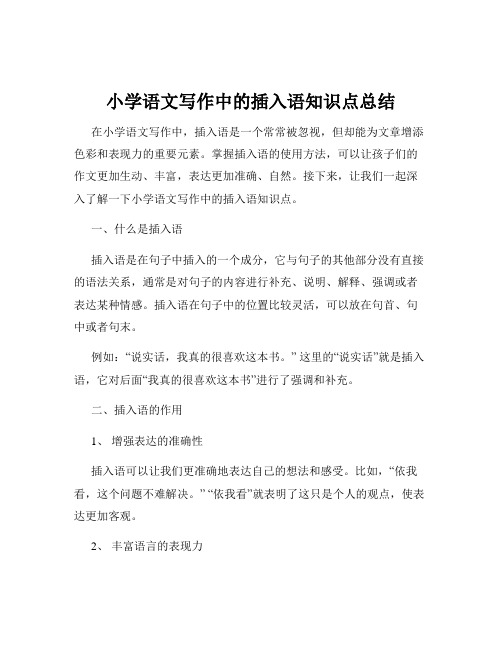插入语用法
sat语法中插入语的灵活用法

SAT语法中插入语的灵活用法插入语起的主要作用就是对句中的某一部分解释、补充说明、总结;表明说话者的态度;强调。
下面是SAT语法中插入语的灵活用法。
SAT语法改进句子中插入语最大的解题原则就是,插入语删掉之后,整个句子结构仍然是完整的!1.常用做插入语的介词短语:in addition,in one’s opinion, in general, in a word,for example, as a result,on the contrary, on the other hand,as a matter of factHis wife is my daughter, in other words, I am his mother-in-law.2.动词V-ing用做插入语Strictly speaking, considering, talking of, judging by, judging fromJudging by her clothes, she may comes from the Northern part.3.常用做插入语的短句I’m afraid, I think , I believe, this is to say, as we know , believe it or not,it seems,what’s moreSome animals are half-hibernate, that’s to say their sleep is not so deep.4.常用做插入语的不定式To be frank, to tell you the truth, to sum up, to start withTo sum up, because of various favorable conditions that we enjoy, there is no doubt that we will be able to catch up with the advanced countries.5.常用做插入语的形容词或短语:true,wonderful,excellent,strange to say,most important of all, sure等Strange to say, he doesn’t receive my birthday gift.6.常用做插入语的副词或短语:indeed,or rather,frankly,personally, surely,fortunately,otherwise,honestly, probablyYou'd better give me my book, otherwise I'll fail my test.注意:插入语独立性比较强,基本上都会用标点符号隔开。
doyouthink作插入语的用法问题.docx

do you think作插入的用法用于混合疑句中。
混合疑句指特殊疑句+一般疑句do you think相当于一个一般疑句混合疑句的句式:特殊疑+do you think(或其他表示心里活的)+述序“ 述序”非常重要。
What can I do ?是一个特殊疑句,如果中插入do you think后面必改述序What do you think I can do?因此 do you think 并不是是插入。
因它影响句子的序,上面的例子只不是凑巧what 是句子的主,所以序没而已插入六大用法小在英学中,插入是一个比重要的知点。
由于插入是一种独立成分,通常与句中其他成分没有法上的关系,多同学在学程中会有一定的困。
其,插入大都是一句行附加明或解,通常由一个、一个短或一个句子构成,常置于句首、句中或句末,一般用逗号或破折号与句子隔开。
下面例插入的几种用法。
例1 _____the more expensive the camera , the better its quality.A.General speakingB.Speaking generalC.Generally speakingD.Speaking generally解析:本答案 C.generally speaking 分短,意思是“一般来”,在句中用作插入。
小:多分短可以用作插入,的分短有:strictly speaking(格地),generally considering (一般), judging from⋯⋯(根据⋯⋯判断)等。
例2 Two middle-aged passengers fell into the sea. ____ , neither of them could swim.A.In factB.LuckilyC.UnfortunatelyD.Naturally解析:本答案 C.unfortunately 副,意思是“令人憾地,不巧,可惜”,在句中用作插入。
初中英语中的省略句与插入语

初中英语中的省略句与插入语在初中英语的学习中,省略句和插入语是两个比较重要的语法点。
理解和掌握它们对于提高英语的理解和表达能力有着重要的意义。
首先,咱们来聊聊省略句。
省略句就是在不影响句子意思完整和清晰的前提下,省略掉一些成分的句子。
这在日常交流中非常常见,可以让语言更加简洁、流畅。
比如,在简单句中就有很多省略的情况。
当主语和谓语动词在上下文明确的情况下,就可以省略。
像“(I)Hope to see you again” 这里就省略了主语“I”。
再比如,“(It)Sounds good” 省略了主语“It”。
在对话中,也经常会出现省略句。
比如问“Would you like some coffee?” 回答“Yes, please (I would like some coffee)” 括号里的部分就被省略了。
还有“Have you finished your homework?” “Not yet (I haven't finished my homework yet)” 这里也是同样的情况。
复合句中的省略就更常见啦。
在宾语从句中,如果从句的内容和主句的宾语重复,就可以省略从句中的宾语。
比如“I think (that) he is right” 这里的“that” 是可以省略的。
在状语从句中,如果从句的主语和主句的主语一致,并且从句中有 be 动词,那么从句的主语和 be 动词可以一起省略。
比如说“When (I am) in trouble, I always turn to my friends for help”接下来,咱们再说说插入语。
插入语是插在句子中的一个成分,它和句子的其他部分没有语法上的直接关系,通常是对句子进行补充说明、解释或者表达说话者的态度等。
常见的插入语有很多种,比如副词或副词短语,像“fortunately”“indeed”“however” 等。
例如,“He, fortunately, passed the exam” “This book, however, is very interesting” 还有介词短语,像“in fact”“of course”“in my opinion” 等。
高中英语语法总结--强调句、It的用法、省略和插入语

高中英语语法总结——强调句、It的用法、省略和插入语一、强调句(一)强调句句型1、陈述句的强调句型:It is/ was + 被强调部分(通常是主语、宾语或状语)+ that/ who(当强调主语且主语指人)+ 其它部分。
e.g. It was yesterday that he met Li Ping.2、一般疑问句的强调句型:同上,只是把is/ was提到it前面。
e.g. Was it yesterday that he met Li Ping?3、特殊疑问句的强调句型:被强调部分(通常是疑问代词或疑问副词)+ is/ was + it + that/ who + 其它部分?e.g. When and where was it that you were born?4、强调句例句:针对I met Li Ming at the railway station yesterday.句子进行强调。
强调主语:It was I that (who) met Li Ming at the railway station yesterday.强调宾语:It was Li Ming that I met at the railway station yesterday.强调地点状语:It was at the railway station that I met Li Ming yesterday.强调时间状语:It was yesterday that I met Li Ming at the railway station.5、注意:构成强调句的it本身没有词义;强调句中的连接词一般只用that, who,即使在强调时间状语和地点状语时也如此,that, who不可省略;强调句中的时态只用两种,一般现在时和一般过去时。
原句谓语动词是一般过去时、过去完成时和过去进行时,用It was …,其余的时态用It is …。
强调句、It的用法、省略和插入语

强调句、It的用法、省略和插入语语法复习五:强调句、It的用法、省略和插入语一、强调句(一)强调句句型1、陈述句的强调句型:It is/ was + 被强调部分(通常是主语、宾语或状语)+ that/ who(当强调主语且主语指人)+ 其它部分。
e.g. It was yesterday that he met Li Ping.2、一般疑问句的强调句型:同上,只是把is/ was提到it前面。
e.g. Was it yesterday that he met Li Ping?3、特殊疑问句的强调句型:被强调部分(通常是疑问代词或疑问副词)+ is/ was + it + that/ who + 其它部分?e.g. When and where was it that you were born?4、强调句例句:针对I met Li Ming at the railway station yesterday.句子进行强调。
强调主语:It was I that (who) met Li Ming at the railway station yesterday.强调宾语:It was Li Ming that I met at the railway station yesterday.强调地点状语:It was at the railway station that I met Li Ming yesterday.强调时间状语:It was yesterday that I met Li Ming at the railway station.5、注意:构成强调句的it本身没有词义;强调句中的连接词一般只用that, who,即使在强调时间状语和地点状语时也如此,that, who不可省略;强调句中的时态只用两种,一般现在时和一般过去时。
原句谓语动词是一般过去时、过去完成时和过去进行时,用It was … ,其余的时态用It is … 。
小学语文写作中的插入语知识点总结

小学语文写作中的插入语知识点总结在小学语文写作中,插入语是一个常常被忽视,但却能为文章增添色彩和表现力的重要元素。
掌握插入语的使用方法,可以让孩子们的作文更加生动、丰富,表达更加准确、自然。
接下来,让我们一起深入了解一下小学语文写作中的插入语知识点。
一、什么是插入语插入语是在句子中插入的一个成分,它与句子的其他部分没有直接的语法关系,通常是对句子的内容进行补充、说明、解释、强调或者表达某种情感。
插入语在句子中的位置比较灵活,可以放在句首、句中或者句末。
例如:“说实话,我真的很喜欢这本书。
” 这里的“说实话”就是插入语,它对后面“我真的很喜欢这本书”进行了强调和补充。
二、插入语的作用1、增强表达的准确性插入语可以让我们更准确地表达自己的想法和感受。
比如,“依我看,这个问题不难解决。
” “依我看”就表明了这只是个人的观点,使表达更加客观。
2、丰富语言的表现力通过插入语,可以让句子更富有变化,避免单调。
像“毫无疑问,他是我们班最优秀的学生。
” “毫无疑问”增强了语气,使对“他是最优秀的学生”这一表述更有力度。
3、体现情感和态度插入语能够传递出作者的情感和态度。
例如,“哎呀,我把作业忘在家里了!” “哎呀”这个插入语表现出了焦急和懊恼的心情。
三、常见的插入语类型1、表示强调的插入语“毫无疑问”“不可否认”“确实”“真的”“显然”等。
2、表达个人观点和看法的插入语“依我看”“在我看来”“我认为”“我觉得”等。
3、表示情感的插入语“哎呀”“哎哟”“哈哈”“嘿嘿”“哼”等。
4、表示解释说明的插入语“比如说”“例如”“举个例子”“换句话说”等。
5、表示时间、地点、条件的插入语“顺便说一下”“顺便提一句”“首先”“其次”“最后”“总之”等。
四、插入语的使用注意事项1、不要滥用插入语虽然插入语有很多好处,但如果使用过多,会让句子显得啰嗦,影响文章的流畅性。
2、注意插入语的位置不同的插入语在句子中的位置有所不同,要根据表达的需要合理安排,避免造成语法错误。
英语中“插入语”常见的种类和用法-精选学习文档

英语中“插入语”常见的种类和用法插入语通常与句中其它部分没有语法上的联系,将它删掉之后,句子结构仍然是完整的。
书写时我们多半用逗号把它与句子的主句分开。
一、插入语的种类较多,常见的有:1.代词词组作插入语能用作插入语的代词词组有all the same , all told , all in all等。
例如:His students was reduced to fifty—six all told.他的学生减少到总共56人。
All in all, her achievement is greatly improved.总的来说,她的成绩有很大的好转。
2. 形容词(短语)作插入语常见的能用作插入语的形容词(短语)有:常见的能用作插入语的形容词(短语)有excellent,most important of all , true , wonderful, sure enough, strange to say , worst still等等。
例如:Wonderful , our team has won again.太好了,我们队又赢了。
Most important of all,we must hand in all the homework..最重要的是,我们要上交所有的作业。
True, it would be too late.真的,时间太晚了。
Strange to say, we have not got the news up to now.说来也奇怪,我们到现在还没有得到这个消息。
3.副词(短语)作插入语能用作插入语的副词(短语)有generally,frankly , indeed , surely , still , exactly,otherwise,, certainly,however , personally , honestly,fortunately , though,besides,perhaps,maybe, probably,or rather, lucki1y,等。
英语插入语用法详解之欧阳家百创编

英语中的插入语插入语一般对一句话作一些附加的说明。
它是中学英语语法的重点,也是高考的考点。
通常与句中其它部分没有语法上的联系,将它删掉之后,句子结构仍然完整。
插入语在句中有时是对一句话的一些附加解释、说明或总结;有时表达说话者的态度和看法;有时起强调的作用;有时是为了引起对方的注意;还可以起转移话题或说明事由的作用;也可以承上启下,使句子衔接得更紧密一些。
掌握这一语言现象不仅有利于对英语句子等的理解,还有利于提高写作等的水平。
插入语的类型较多,常见的如下几种:欧阳家百(2021.03.07)一、形容词(短语)作插入语。
能用作插入语的形容词(短语)常见的有:true,wonderful,excellent,strange to say,most important of all, sure enough等。
如:True,it would be too bad.真的,太糟了。
Wonderful,we have won again.太好了,我们又赢了。
Strange to say,he hasn’t got my letter up to now.说来也奇怪,他到现在还没有收到我的信。
Most important of all,we must learn all the skills.最重要的是,我们必须掌握所有的技巧。
二、副词(短语)作插入语。
能用作插入语的副词(短语)有:indeed,surely,still,otherwise,certainly,however,generally,personally,honestly,fortunately,luckily,though,besides,exactly,perhaps,maybe,probably,frankly,or rather等。
如:When he got to there,he found,however,that the weather was too bad.可是到了那儿之后他发现,那儿的天气太坏了。
- 1、下载文档前请自行甄别文档内容的完整性,平台不提供额外的编辑、内容补充、找答案等附加服务。
- 2、"仅部分预览"的文档,不可在线预览部分如存在完整性等问题,可反馈申请退款(可完整预览的文档不适用该条件!)。
- 3、如文档侵犯您的权益,请联系客服反馈,我们会尽快为您处理(人工客服工作时间:9:00-18:30)。
英语插入语用法详解插入语一般对一句话作一些附加的说明。
它是中学英语语法的重点,也是高考的考点。
掌握这一语言现象不仅有利于对句子、篇章的理解,而且也有助于提高书面表达的写作水平。
一、常见的插入语有形容词(词组)、副词、不定式、现在分词短语、介词短语、从句以及固定短语。
1.常见的形容词(词组)、副词作插入语的有:sure enough(果然); strange; worse still(更糟糕的是);most important(最重要的是); honestly; obviously; however; otherwise; luckily; unfortunately; besides; first; second; especially; surprisingly等。
例如:Worse still, the lion could even carry off the baby in its mouth.We must do the experiment carefully; otherwise you'll get another result.Honestly, I don't need it at the moment.He likes the country, especially in spring.2.常见的不定式有:to tell the truth; to be short(简单地);to begin with(首先); to be sure(自然、当然、果然);to be honest/frank; to make things worse; to make a long story short; to speak of(值得一提的是),to be fair ,to sum up(概括地说) 等。
这些插入语表示说话人的态度,在句子中作独立成份。
例如:________ the truth, this is all Greek to me.A. TellB. To tellC. TellingD. Told [Key: B]That's a good idea, to be sure!To make things worse, many of the men have gone off to cities in search of higher pay.3.常见的现在分词短语有:generally speaking; frankly speaking; judging from/by; talkingof(谈到); considering(考虑到,因为是);putting it mildly(说得客气一点)等。
这些分词用来修饰全句。
例如: Judging from appearance, he seems to be a strong man.4.常见的介词短语有:in fact; in addition; in a word; on the other hand; in other words; in one's opinion; in that case; by the way; of course; as a rule(通常);to one's surprise; for example;on the contrary(相反);in a way(在某点上、在某种程度上); for one thing; for another (thing)等。
例如:In a way, I think we both won in the game.5.常见的从句有:if you don't mind; if you like; if you please; if necessary; if any; if I may say so; if convenient; as it happens等。
例如:You can, ________, come to join us in the game.A. if you pleaseB. if you possibleC. if you happyD. if you necessary [Key: A]6.常见的固定短语:as a result; that is (to say); what's more; as above; all in all(总之),等。
例如:All in all, they have had a wonderful time today.二、插入语的位置,可放在句首、句中或句末,一般用逗号或分号隔开。
例如:Besides, I enjoy learning about new things from politics to sports and music.He knows three foreign languages, namely, English, Japanese and Spanish.但是有些词或短语可插在句子中,不用逗号隔开。
例如:What on earth are you doing here?三、表示疑问的插入语结构含think, suppose, guess, say, imagine, expect, believe等动词的疑问句,后接含疑问词的宾语从句时,要将疑问词放在句首。
例如:Whom do you think I should see first?这一结构可改为:Whom should I see first, do you think?He made another wonderful discovery, ________of great importance to science.A. which I think isB. which I think it isC. which I think itD. I think is [Key: A]这里I think是插入语。
which引导非限制性定语从句,故选A。
稳固练习:请选出最正确答案1. It is always difficult being in a foreign country, ________if you don't speak thelanguage. (NMET2000)A. extremelyB. naturallyC. basicallyD. especially2. ________be sent to work there? (上海2002)A. Who do you suggestB. Who do you suggest that shouldC. Do you suggest who shouldD. Do you suggest whom should3. Two middle-aged passengers fell into the sea ,________, neither of them could swim.A. in factB. luckilyC. unfortunatelyD. naturally 4. Never waste anything, and________, never waste time.A. after allB. at allC. in allD. above all5. His father came home at midnight, and ________, he was drunk.A. as a resultB. that is to sayC. what's moreD. sooner or later6. My sister speaks English_____, if not better than, my brother.A. as wellB. as well asC. so wellD. so well as7 _____, you have given me a lot of help.A Tell the truth B. To tell the truth C. Telling true D. Telling truth8. _____his face, the young man must be over 20.A. Judged fromB. JudgedC. Judging from D .Judging9. I don’t picking up your thing from the store ,____,the walk will do me good .A. sooner or laterB. stillC. in timeD. besides10. What he said,_____, has nothing to do with what he did.A. to my surprise B .to my surprised C. to my surprising D. to our surprisesKEY: DACDC BBCDA英语插入语的几种常见用法是英语语法中的一个重要考点,它是指插在句子中的词语或句子,其位置比较灵活,通常被逗号、破折号或句子的其他部分隔开,与句子的其他部分之间没有语法上关系。
插入语通常是对一句话的附加解释、说明或总结,有时表示说话人的态度和看法,有时起强调作用,有时是为了引起对方的注意,还可以起转移话题或说明原因的作用,也可以承上启下,使语句间的衔接更紧密。
插入语的种类比较多,常见的有以下几种:1.副词(短语)作插入语常见的有:indeed,surely,however,obviously,naturally,luckily,happily,fortunately,strangely,briefly,actually,altogether,further,besides,similarly,exactly,especially等。
如:Surely.I will keep the secret for my wholelife.Strangely,he hasn’t written to me for half a year.2.形容词(短语)作插入语常见的有:strange,sure enough,worse still,even better,hard to say,most important ofall,worst ofall等。
如:Most important of all,each of us fulfilled our own task.3.介词短语作插入语常见的有:to one’s jo y,in a word,in short,on the contrary,in other words,in a/some sense,in general,in one’s view/opinion,in conclusion,in reality,as a matter of fact,in a addition,in turn,in return,as a consequence/result等。
